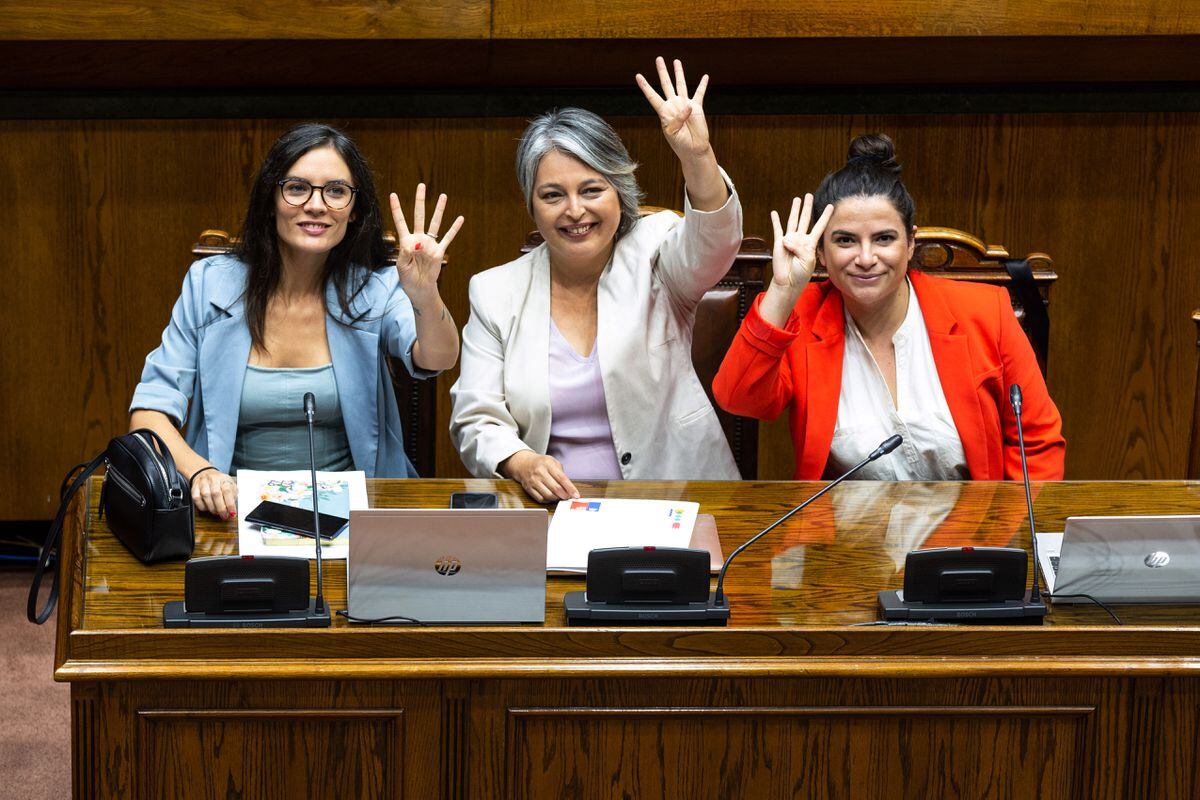Photograph provided by the Chilean Senate, of the Minister of Labor, Jeannette Jara (c), together with the Government Spokesperson, Camila Vallejos (i) and the Minister for Women and Gender Equality, Antonia Orellana (d). Chilean Senate (EFE/Chilean Senate)
The project that seeks Chileans to work 40 hours a week, and not 45 as at present, is about to become law.
The Senate has unanimously approved the initiative, in one of the few cases in which the Chilean political class has put itself behind a legislative crusade, regardless of the differences between the ruling party and the opposition.
While waiting for its third and final process in the Chamber of Deputies, the Government of Gabriel Boric hopes to promulgate the law on the occasion of International Workers' Day, on May 1.
With this law, Chile would join Ecuador as the only two countries in Latin America to achieve 40 weekly hours of work.
In Argentina, Bolivia, Costa Rica, Mexico, Nicaragua, Panama, Paraguay, Peru, Uruguay and Colombia, the 48-hour work week is in force, although Colombia is on the path to reducing it to 42 hours by 2026. The Government of Gustavo Petro has just presented a labor reform that includes making that reduction immediately.
In Brazil, El Salvador, Guatemala and Venezuela they have between 42 and 45 hours of weekly work, according to updated data from the International Labor Organization (ILO).
According to the Organization for Economic Cooperation and Development (OECD), Latin America is one of the areas in the world where more hours are worked per year and has one of the highest labor informality rates,
It has been five years of debate in Congress to make the 40-hour work week a reality.
The project was an initiative of the current spokeswoman for La Moneda, Camila Vallejo, in her capacity as a deputy, but it was reactivated in the current Administration, which started in March 2022. Although in these years it has undergone dozens of modifications, especially in terms of Regarding gradualness, the heart of the law remains the same: the reduction in the number of hours worked in Chile, where workers have 15 working days of vacation per year, that is, three weeks.
For the Boric government, this is one of its most symbolic initiatives.
The Minister of Labor and Social Welfare, Jeannette Jara, a communist militant like Vallejo, assured in an interview with EL PAÍS in November: “There are many theoretical discussions, but if one sees that people travel for more than an hour and a half by bus [bus] to get to work and this law would allow them to sit down, they have another perspective on things.
If a woman, before going to work, can leave her children awake and not asleep, the same thing.
When public policies are formulated, it is always necessary to take into account how this impacts in real life”.
Minister Jara has been one of the main promoters of the 40-hour project from the Executive and in different political and social spheres her ability to reach agreements with sectors such as the businessmen themselves is recognized, whom she has convinced that this initiative improves people's quality of life and productivity.
In June of last year, in parallel to the legislative discussion, the Ministry of Labor launched the 40-hour stamp, a certification that seeks to recognize companies that have moved towards working less than 45 hours a week.
As of March 15, 503 companies –mainly small and medium-sized– had obtained the certificate.
"Many times it was said that this was impossible, but many companies have shown us that, even without the law, they were able to anticipate the reduction in working hours," said Minister Jara on Tuesday from Congress, where the project was widely supported. unanimous by the senators.
The application will be gradual to protect the economy, jobs and wages.
The reduction will be from 45 to 44 hours the first year the law is in force, to 42 hours the third year and 40 the fifth year, with special support for small and medium-sized companies.
The proposal, which is one step away from becoming a law of the Republic, contemplates the possibility of working hours of four days a week –known in Chile as 4x3–, with three days off.
"The bill contemplates a maximum term for the reduction of the working day for those employers who require it," said Minister Jara.
“In other words, any employer who wants to anticipate the reduction of the workday to 40 hours or the 4x3 workday can do so perfectly.
In fact, we have delivered the 40-hour stamp to companies that have reduced working hours without having a law”, affirmed the Boric minister.
Jara has also specified the benefits for women of this change to the Labor Code.
"It includes co-responsibility measures, which aim to reconcile work, personal and family life, with what is expected, particularly for women, to expand employment possibilities and with greater stability," said the Secretary of State, who has a a fundamental and difficult mission on the horizon, such as moving forward with the pension reform, together with the Minister of Finance, Mario Marcel.
Subscribe here to the EL PAÍS America newsletter and receive all the latest news in the region.
Subscribe to continue reading
Read without limits
Keep reading
I'm already a subscriber








